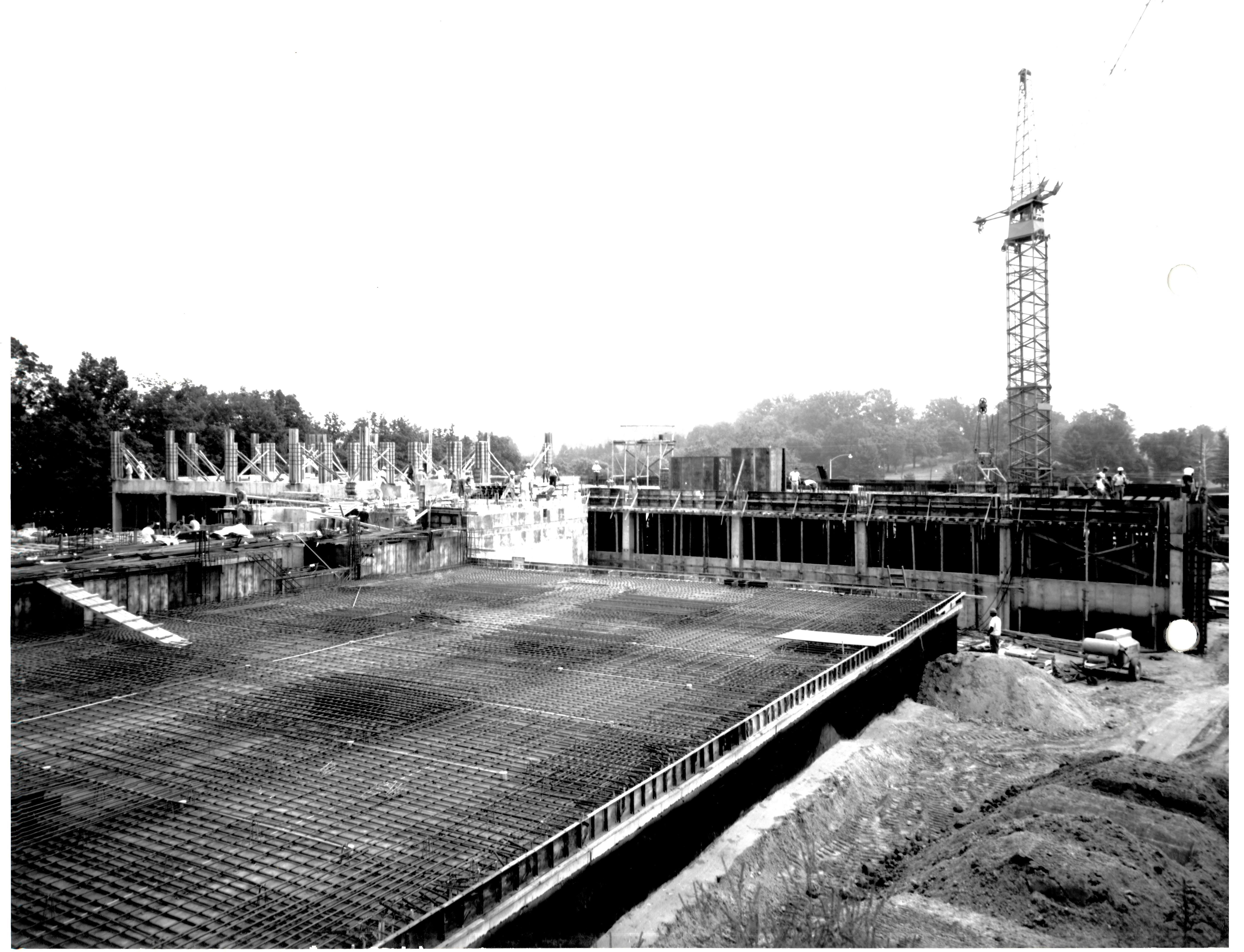Construction
of Building 31 C Wing in 1967. The C Wing added the first NIH Conference Center
(Photo Credit: Office of NIH History and Stetten Museum)
The Building 31 Conference Center has served the NIH well for 50 years but has not received any significant updates and is showing its age and inadequacies. The original building opened in 1962 and the construction on the C Wing began in 1967. In 1989, the building was renamed after Representative Claude D. Pepper (D-FL) who served in both the United States Senate and the House. In 1937, while serving as Senator from Florida, he introduced legislation creating the National Cancer Institute. He was also an advocate for the elderly.
The 6th floor of the C wing housed the first NIH Conference center with five rooms. Over its 50 years of service, the center has hosted thousands of congressionally mandated quarterly Advisory Board and Council meetings with over half a million attendees. Currently, the 6th floor conference center hosts 1,800 high profile scientific meetings annually. With many years of heavy use, without any major remodeling, the conference center has become a dated facility lacking the necessary infrastructure to support high level scientific research discussion.

Construction of Building 31 C Wing in 1967. The C Wing added the first NIH Conference Center (Photo Credit: Office of NIH History and Stetten Museum)
Fortunately, the Office of Research Services, Events Management Branch, in partnership with the Office of Research Facilities, will commence a yearlong renovation to the 6th floor Conference Center beginning Monday, December 17, 2018. Reopening is tentatively scheduled for mid-January 2020. The scope includes: new audio/visual (AV) equipment; improving fire egress and floor plan efficiency; installation of energy efficient LED lighting and double pane windows; replacement of HVAC/air handling units with an energy efficient system located in the penthouse; individual temperature controls for each room; asbestos abatement; an expansion of the women's restroom; and improvement to the overall appearance and flexibility of the space. The area will be demolished down to the columns.
A substantial amount of the project funding came from savings achieved during the Natcher AV upgrades. Switching Natcher's AV system design reduced cabling and labor costs by 40 percent. With the support of NIH leadership, these savings were redirected to the 31 Conference Center renovation and the remainder of the construction costs were realized through operational efficiencies.
After December 17, there will be no access to the C wing 6th floor, elevators will be locked out, and vending machines will be removed as well as the coffee brewing stations. Noise from demolition and core drilling will begin early but end by 9am. The dumpsters at the loading dock will also be removed by 9am each morning. The freight elevator will be in constant use for demolition and deliveries. A crane may be required for window installation and new HVAC equipment. Utility shutdowns should not impact the rest of the building.
In preparation for the closing, Events Management reviewed existing centrally managed conference space to see where renovations and AV equipment upgrades could accommodate alternate large venues. In Natcher, the wall separating conference rooms A and B was removed and a movable partition installed creating a large divisible space with a capacity similar to rooms 6 and 10. Building 60 has new AV and video production systems installed and additional upgrades are scheduled for late December 2018. New furniture was ordered for Building 60 and delivery is scheduled for the week of December 27. The 6700B Rockledge Drive Conference Center opened in August and is a great alternative space similar to rooms 6 and 10.
The Events Management staff appreciate your patience during the construction and apologizes for any noise or disruptions during this long overdue renovation. Reservations can be made for the new and improved 31 Conference Center for events occurring after February 1, 2020. If you have any questions about the project please contact Ken Ryland, Branch Chief, NIH Events Management.
